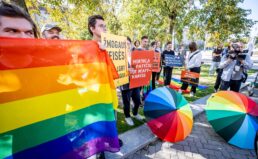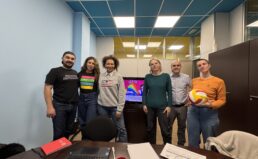JERUSALEM — A small rainbow flag that hangs from the second floor of a nondescript building on HaSoreg Street near Jerusalem’s Zion Square is the only visible sign that the offices of Jerusalem Open House for Pride and Tolerance are inside.
Tom Canning, director of development of the local LGBT advocacy group, on Nov. 13 spoke with more than two dozen people from the U.S. who were in Israel with A Wider Bridge, which describes itself as an “LGBTQ advocacy group building connections between the Israeli and North American LGBTQ communities.”
He told the group that vandals used to regularly burn rainbow flags that had been placed outside of Jerusalem Open House’s offices. Canning said staffers replaced them and the amount of time they remained in place increased “until we reached a point where no one is burning down a flag.”
“It’s always been by incremental steps,” he said.
Clinic among ‘services to the city’
Progress for Jerusalem’s LGBT community has been incremental since a group of local residents established Jerusalem Open House in 1997.
Canning is one of four full-time employees. Jerusalem Open House also has eight part-time employees, 200 volunteers and thousands of people who visit its offices each year.
Canning said Jerusalem Open House filled the social needs of LGBT Jerusalemites when it was founded. He told the group that the organization soon discovered there “were other issues being faced by the community.”
Jerusalem Open House in 2008 founded a clinic that offers anonymous HIV testing and counseling to anyone — Palestinians, ultra-Orthodox Jews, sex workers and others — in the conservative city who needs access to sexual and general health care outside of what Canning described to the Washington Blade as “the mainstream health system.” It is also the only non-emergency room setting in Israel that has a doctor who is authorized to prescribe post-exposure prophylaxis.
Those who receive a PEP prescription still need to go to an emergency room to receive it. The Israeli government has yet to authorize the distribution of PrEP in the country.
“It’s anonymous; it’s non-bias,” said Canning, referring to Jerusalem Open House’s clinic. “For those reasons it’s even more popular among the heterosexual community than it is among the LGBT community. It’s one of our services to the city.”
Jerusalem officials sued over financial support
Canning said Jerusalem Open House has a “constant” annual budget of around $350,000.
The bulk of this money comes from Jews who live in North America. The municipality of Jerusalem this year gave Jerusalem Open House more than 400,000 NIS ($105,214.72), which is the largest grant it has ever received.
Jerusalem Open House has been embroiled in a series of legal battles with local officials over the last decade.
Jerusalem Open House in 2002 sued the city after they rejected their application for a grant for its first Pride march because “it didn’t meet the criteria.” Jerusalem officials later gave Jerusalem Open House 40,000 NIS ($10,521.47) after the Israeli Supreme Court recommended they do so.
Jerusalem Open House in 2005 appealed the city’s decision not to “perform the actions needed for” its Pride parade. A court ruled in Jerusalem Open House’s favor and ordered Jerusalem officials to place rainbow flags along the march’s route and “carry out what is needed.”
Then-Mayor Uri Lupolianski, who is ultra-Orthodox, challenged the ruling.
The court ordered Jerusalem officials to pay 30,000 NIS ($7,891.10) in court fees and fined Lupolianski 30,000 NIS ($7,891.10) personally. He refused to pay it.
Jerusalem Open House in a lawsuit it filed against the city in 2011 alleged that officials discriminated against them because they gave them “a low amount of financial support.” The court ruled the city must provide the same amount of funding to Jerusalem Open House that other local community organizations receive.
“It’s great and its lovely that we have such a progressive and such a supportive Jewish community in America, but we need local authorities to also take responsibility,” said Canning.
“What we’re doing here is filling a government role,” he added. “It’s not the job of civil society to provide health care, to provide mental health services and to fight against bullying in schools.”
Shira Banki’s death sparked ‘wave of homophobia’
Tel Aviv, which is less than an hour’s drive northwest of Jerusalem, is known as one of the world’s most LGBT-friendly cities.
The Aguda, which is the Israeli National LGBT Task Force, and other advocacy groups are based in the city.
Mickey Gitzen, who is a member of left-wing secular Meretz Party, is one of three openly gay members of the Tel Aviv Municipal Council. The city also provides funding for its annual Pride parade in which hundreds of thousands of people take part in June.
Jerusalem Open House organizes Jerusalem’s annual Pride parade.
Yishai Schlissel, an ultra-Orthodox Jew, stabbed three people during the 2005 Jerusalem Pride parade. He killed Shira Banki, a 16-year-old teenager, and injured six others at the same event last year.
The attack took place less than a month after Schlissel completed a 10-year prison sentence in connection with the 2005 stabbings.
Israeli Prime Minister Benjamin Netanyahu, Jerusalem Mayor Nir Barkat and the Obama administration condemned Banki’s death. Israeli President Reuven Rivlin was among the more than 5,000 people who attended a “mass rally” in Jerusalem in the days after the teenager died.
Canning said vandals burned rainbow flags throughout the city after Banki’s murder.
“A real wave of homophobia swept through the city during that time,” he said, noting a straight grandfather bought flags to replace those that had been burned.
Jerusalem authorities earlier this year announced they plan to rename Zion Square in Banki’s honor. U.S. Ambassador to Israel Dan Shapiro told the Blade last month during an interview in Tel Aviv that Banki’s family supports a pro-LGBT curriculum in Jerusalem’s schools that the U.S. backs.
The Jerusalem District Court in June sentenced Schlissel to live in prison plus 31 years. Barkat told an Israeli newspaper a few weeks later that he would not attend this year’s Jerusalem Pride march because he did not “want to be part of the harm to the ultra-Orthodox public and the religious Zionist public.”
“That’s not the end of our story,” said Canning.
Jerusalem Open House story is one ‘of success’
Banki’s murder took place less than six months before protesters who contend the Israeli government promotes LGBT rights to divert attention from its controversial policies towards the Palestinians protested A Wider Bridge reception at the National LGBTQ Task Force’s 2016 Creating Change Conference in Chicago.
Canning and Jerusalem Open House Executive Director Sarah Kala-Meir had been scheduled to speak. They left the reception through a back door as protesters entered the room in which it was taking place.
Canning did not discuss the protest or those who accuse the Israeli government and its supporters of “pinkwashing” during his meeting with the group from A Wider Bridge.
Jerusalem’s Old City and East Jerusalem, of which Israel took control and annexed from Jordan during the 1967 Six-Day War, are less than a mile from Jerusalem Open House’s offices. Ramallah, the West Bank city that is the Palestinian Authority’s capital, is roughly 10 miles north of Jerusalem.
Israeli law prevents Israeli citizens from entering Ramallah and other areas of the West Bank that are under the Palestinian Authority’s control. Palestinians cannot enter Israel from the West Bank without a special permit.
Canning said Jerusalem Open House’s story is one “of success” despite the setbacks and challenges that they continue to face.
“This last year has been huge for the LGBT community in Israel, in Jerusalem,” he said. “We’re seeing (real progress) on the ground for people and we believe that when we face violence, when we face oppression we will only insist further.”
“That will (advance) our cause further,” added Canning.




